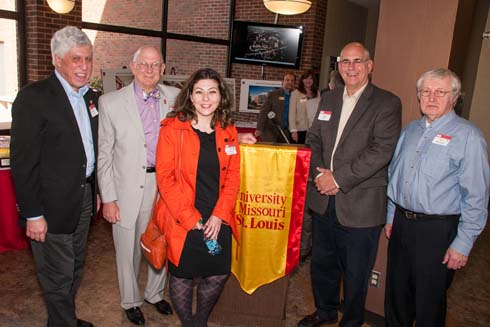
On April 20, more than 150 alumni, faculty and friends attended “50 Years of Great Chemistry,” a Jubilee event celebrating the Department of Chemistry and Biochemistry. Chemistry alumni included (from left) Joseph Bono, BS 1969; Michael Finkes, BS 1973 and MS 1978; Yanina Levchinsky-Grimmond, BS 1997 and MS 1999; Jim Grib, BS 1976 and MS 1982; and Ken Henderson, BS 1972. (Photo by Dan Younger)
Joseph Bono graduated from the University of Missouri–St. Louis in 1969 with a bachelor’s degree in chemistry. He shares many of the same memories that others have of UMSL’s early years. So, when he traveled from his home in Virginia last week to attend the reunion “50 Years of Great Chemistry,” Bono recalled the old clubhouse, classes in the laundromat and the opening of Benton Hall.
“After this visit, I realized my fondest UMSL memory is the camaraderie,” Bono said. “You were never just a number. The advanced chemistry students were all pretty tight. The faculty cared, not only about those students at the top of the class, but everyone. We all cared about each other. And that’s what we’re remembering – how much fun it was back then.”
UMSL’s Great Chemistry event was held as part of the UMSL Jubilee, a yearlong celebration of UMSL’s founding in 1963.
Bono also earned a master’s degree in political science in 1979. He recently retired from a long and distinguished career, most of it spent as a forensic scientist with the federal government. He was director of the forensic science laboratories for the Drug Enforcement Agency, the Naval Criminal Investigative Services in Washington, D.C., and the St. Louis County Police Department. He also taught in the Forensic and Investigative Sciences Program at Indiana University Purdue University Indianapolis.
Lawrence Barton, professor emeritus of chemistry and biochemistry, arrived at UMSL in 1966. He served as chair of the department from 1980 to 1998 and as director of the Center for Molecular Electronics until 2006. As the unofficial historian of the department, he served as one of the organizers of the event, which attracted more than 150 people.
“It actually exceeded my expectations,” Barton said. “Alumni came from all over the country.”
With his history collection, Barton provided materials for slide shows and posters. He had a display of departmental milestones, a timeline of chemistry faculty and staff over 50 years, memorabilia and listings of alumni who had received Distinguished Alumni Awards.
For the record: From 1971 to present day, 48 major awards were presented to faculty for research and teaching, some of them multiple times. Eight chemistry alumni received Distinguished Alumni Awards, and delivered 25 Distinguished Alumni Lectures.
“I dug out lots of old stuff, things nobody else wants,” he said. “It all added to the camaraderie.”
Barton recalled the earliest days of the university when he was brought in by Charles Armbruster, the division director, to help build the science program. It was top-notch, right from the start, he said.
“Chemistry was there from the beginning, followed quickly by biology and physics,” he said. “UMSL’s first graduating class in 1967 had 10 chemistry majors, and all but one of them went on to graduate school.”
Chemistry alumni came from all over the country to celebrate – Oregon, New York, and the mountains of northern Georgia. Most alumni have remained in the St. Louis region developing careers in chemistry with companies such as Mallinckrodt, Sigma, Pfizer and Steris. Some went on to medical and dental school. Others are teaching.
Michael Finkes, who earned a bachelor’s degree in chemistry in 1973 and returned to get his master’s degree in chemistry in 1978, was one of those alumni. He recently retired from Monsanto after 35 years, a job he got, thanks to UMSL.
“I came back to UMSL because I needed to learn more lab skills,” Finkes said. “I worked with David Garin in chemistry doing some research, honed my skills and when I interviewed, they wanted to know all about that research.”
Finkes has remained very active with the chemistry department and has served on the executive committee of the Alumni Association for many years. Among alumni groups, chemistry stands out as a very active one. They recently developed a LinkedIn group page that numbers more than 300. Finkes says there’s a formula for their success.
“It doesn’t happen by itself,” he said. “The faculty respected us, showed a lot of interest in us and they developed that culture. And once we left, they kept up with us. It takes the existence of that culture and work of several key faculty like Lol Barton.”














